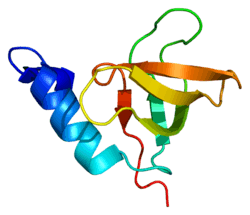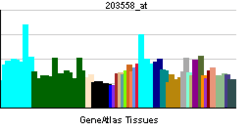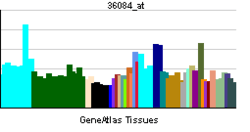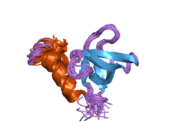CUL7
| View/Edit Human | View/Edit Mouse |
Cullin-7 is a RING-E3 ligase protein that in humans is encoded by the CUL7 gene.[3][4][5]
Clinical significance
It is associated with 3-M syndrome.
Interactions
CUL7 has been shown to interact with RBX1.[3]
References
- ↑ "Human PubMed Reference:".
- ↑ "Mouse PubMed Reference:".
- 1 2 Dias DC, Dolios G, Wang R, Pan ZQ (Dec 2002). "CUL7: A DOC domain-containing cullin selectively binds Skp1.Fbx29 to form an SCF-like complex". Proc Natl Acad Sci U S A. 99 (26): 16601–6. doi:10.1073/pnas.252646399. PMC 139190
 . PMID 12481031.
. PMID 12481031. - ↑ Arai T, Kasper JS, Skaar JR, Ali SH, Takahashi C, DeCaprio JA (Aug 2003). "Targeted disruption of p185/Cul7 gene results in abnormal vascular morphogenesis". Proc Natl Acad Sci U S A. 100 (17): 9855–60. doi:10.1073/pnas.1733908100. PMC 187864
 . PMID 12904573.
. PMID 12904573. - ↑ "Entrez Gene: CUL7 cullin 7".
Further reading
- Kim SS, Shago M, Kaustov L, et al. (2007). "CUL7 is a novel antiapoptotic oncogene.". Cancer Res. 67 (20): 9616–22. doi:10.1158/0008-5472.CAN-07-0644. PMID 17942889.
- Jung P, Verdoodt B, Bailey A, et al. (2007). "Induction of cullin 7 by DNA damage attenuates p53 function.". Proc. Natl. Acad. Sci. U.S.A. 104 (27): 11388–93. doi:10.1073/pnas.0609467104. PMC 2040908
 . PMID 17586686.
. PMID 17586686. - Skaar JR, Florens L, Tsutsumi T, et al. (2007). "PARC and CUL7 form atypical cullin RING ligase complexes.". Cancer Res. 67 (5): 2006–14. doi:10.1158/0008-5472.CAN-06-3241. PMID 17332328.
- Kaustov L, Lukin J, Lemak A, et al. (2007). "The conserved CPH domains of Cul7 and PARC are protein-protein interaction modules that bind the tetramerization domain of p53.". J. Biol. Chem. 282 (15): 11300–7. doi:10.1074/jbc.M611297200. PMID 17298945.
- Kasper JS, Arai T, DeCaprio JA (2006). "A novel p53-binding domain in CUL7.". Biochem. Biophys. Res. Commun. 348 (1): 132–8. doi:10.1016/j.bbrc.2006.07.013. PMID 16875676.
- Andrews P, He YJ, Xiong Y (2006). "Cytoplasmic localized ubiquitin ligase cullin 7 binds to p53 and promotes cell growth by antagonizing p53 function.". Oncogene. 25 (33): 4534–48. doi:10.1038/sj.onc.1209490. PMID 16547496.
- Huber C, Dias-Santagata D, Glaser A, et al. (2005). "Identification of mutations in CUL7 in 3-M syndrome.". Nat. Genet. 37 (10): 1119–24. doi:10.1038/ng1628. PMID 16142236.
- Gerhard DS, Wagner L, Feingold EA, et al. (2004). "The status, quality, and expansion of the NIH full-length cDNA project: the Mammalian Gene Collection (MGC).". Genome Res. 14 (10B): 2121–7. doi:10.1101/gr.2596504. PMC 528928
 . PMID 15489334.
. PMID 15489334. - Mungall AJ, Palmer SA, Sims SK, et al. (2003). "The DNA sequence and analysis of human chromosome 6.". Nature. 425 (6960): 805–11. doi:10.1038/nature02055. PMID 14574404.
- Strausberg RL, Feingold EA, Grouse LH, et al. (2003). "Generation and initial analysis of more than 15,000 full-length human and mouse cDNA sequences.". Proc. Natl. Acad. Sci. U.S.A. 99 (26): 16899–903. doi:10.1073/pnas.242603899. PMC 139241
 . PMID 12477932.
. PMID 12477932. - Nakayama M, Kikuno R, Ohara O (2003). "Protein-protein interactions between large proteins: two-hybrid screening using a functionally classified library composed of long cDNAs.". Genome Res. 12 (11): 1773–84. doi:10.1101/gr.406902. PMC 187542
 . PMID 12421765.
. PMID 12421765. - Winston JT, Koepp DM, Zhu C, et al. (1999). "A family of mammalian F-box proteins.". Curr. Biol. 9 (20): 1180–2. doi:10.1016/S0960-9822(00)80021-4. PMID 10531037.
- Nomura N, Nagase T, Miyajima N, et al. (1995). "Prediction of the coding sequences of unidentified human genes. II. The coding sequences of 40 new genes (KIAA0041-KIAA0080) deduced by analysis of cDNA clones from human cell line KG-1.". DNA Res. 1 (5): 223–9. doi:10.1093/dnares/1.5.223. PMID 7584044.
External links
This article is issued from Wikipedia - version of the 6/6/2016. The text is available under the Creative Commons Attribution/Share Alike but additional terms may apply for the media files.



